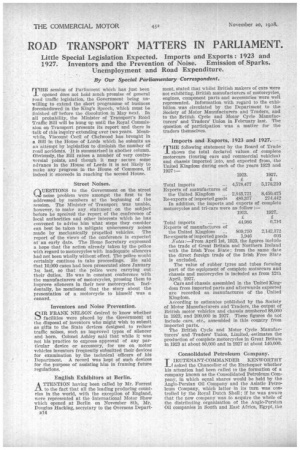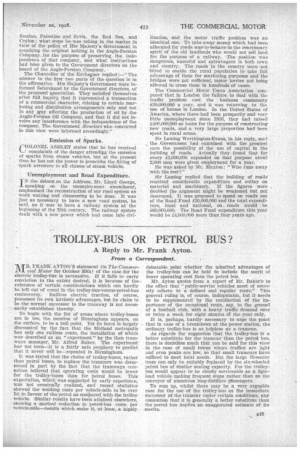ROAD TRANSPORT MATTERS IN PARLIAMENT.
Page 10

Page 11

If you've noticed an error in this article please click here to report it so we can fix it.
Little Special Legislation Expected. Imports and Exports : 1923 and 1927. Inventors and the Prevention of Noise. Emission of Sparks. Unemployment and Road Expenditure.
By Our Special Parliamentary -Correspondent.
THE session of Parliament which has just been opened does not hold much promise of general road traffic legislation, the Government being unwilling to extend the short programme of business foreshadowed in the King's Speech, which must be finished eft before the dissolution in May next. In all probability, the Minister of Transport's Road Traffic Bill will be hung up until the Royal Commission on Transport presents its report and there is talk of this inquiry extending over two years. Meanwhile, Viscount Cecil of Chelwood has brought in ft. -Bill In. the House of Lords which he submits as an attempt by legislation to diminish the number of road accidents. -It is surntriarized In another. column. Obviously, the Bill raises a. nunther of very controversial points, and though it may • secure some advance in the House of Lords it is not likely to make any progress in the House of Commons, If indeed it succeeds in reaching the second House.
Street Noises.
rtUESTIONS to the Government on the street keit noise problem were amongst the first to be addressed by members at the beginning of the session. The Minister of Transport was unable, however, to make any statement on the subject before he received the report of the conference of local authorities and other interests which he Ims convened to advise him what steps they consider can best be taken to mitigate unnecessary noises made by mechanically propelled vehicles. The report of the views of the conference is expected at an early date. The Home Secretary expressed a hope that the action already taken by the police with regard to motorcycles with inadequate silencers had not been wholly without effect. The police would certainly continue to take proceedings. He said that 10,000 cases had been prosecuted .since January 1st last, so that the police were carrying out. their duties. He was in constant conference with the manufacturers of motorcycles, pressing them to improve silencers in their new motorcycles. Incidentally, he mentioned that the story about the presentation of a motorcycle to himself was a canard.
Inventors and Noise Prevention.
QHI. FRANK NELSON desired to know whether
facilities were placed by the Government at the disposal of inventors who might wish to submit as gifts to the State devices designed to reduce traffic noises, such as improved types of silencer and horn. Colonel Ashley said that while it was not his 'practice to express approval of any particular device or accessory, for use on motor vehicles inventors frequently submitted their devices for examination by the technical officers of his Department. A record was kept of such devices for the purpose of assisting him in framing future regulations.
English Exhibitors at Berlin.
A TTENTION having been called by Mr. Forrest Xi to the fact that all the leading producing countries in the world, with the exception of England, were represented at the International Motor Show which opened at Berlin on November 8th, Mr. Douglas Hacking, secretary to the Overseas Depart
n14 meat, stated that whilst British makers of cars were not exhibiting, British manufacturers of motorcycles, engines, component parts and accessories were well represented. Information with regard to the exhibition was circulated by the Department to the Society of Motor Manufacturers and Traders, and to the British Cycle and Motor Cycle Manufac-. tnrers' and Traders' Union in February last. The question of participation was a matter for the traders themselves.
Imports and Exports, 1923 and 1927.
THE following statement by the Board of Trade shows the total declared values of complete motorcars (touring cars and commercial vehicles) and chassis imported into, and exported from, the United Kingdom during each of the years 1923 and 1927:—
direct foreign trade of the Irish Free State Is excluded.
The value of rubber tyres and tubes forming part of the equipment of complete motorcars and chassis and motorcycles is included as from 12th April, 1927.
Cars and chassis assembled in the United Kingdom froth imported parts and afterwards exported are recorded as manufactures of the , United Kingdom.
According to estimates published by the Society of Motor Manufacturers and Traders, the output of British motor vehicles and chassis numbered 88,000 in 1923, and 209,000 in 1927, These figures do not include cars, etc., assembled in this Country from imported parts.
The British Cycle and Motor Cycle Manufacturers' and Traders' Union, Limited, estimates the production of complete motorcycles in Great Britain in 1923 at about 80,000 and in 1927 at about 140,000.
Consolidated Petroleum Company.
T IEUTENANT-COMMANDER KEN ,
Consolidated Petroleum Company.
T IEUTENANT-COMMANDER KEN ,
asked the Chancellor of the Exchequer whether . his attention had been called to the formation of a company known as the Consolidated Petroleum Company, in which equal shares would be held by the Anglo-Persian Oil Company and the Asiatic Petroleum Company, which latter in its turn was controlled by the Royal Dutch Shell ; if he was aware that the new company was to acquire the whole of the distributing organization of the Anglo-Persian Oil companies in South and East Africa, Egypt, the asked the Chancellor of the Exchequer whether . his attention had been called to the formation of a company known as the Consolidated Petroleum Company, in which equal shares would be held by the Anglo-Persian Oil Company and the Asiatic Petroleum Company, which latter in its turn was controlled by the Royal Dutch Shell ; if he was aware that the new company was to acquire the whole of the distributing organization of the Anglo-Persian Oil companies in South and East Africa, Egypt, the
Soudan, Palestine and Syria, the Red Sea, and Ceylon ; what steps he was taking in the matter in view of the policy of His Najesty's Government in acquiring the original holding in the Anglo-Persian Company, for the purpose of preserving the independence of that company, and what instructions had been given to the Government directors on the board of the Anglo-Persian ,Company. The Chancellor of the Exchequer replied :—" The answer to the first two parts of the question is in the affirmatiye. Hie Majesty's Government were informed beforehand by the Government directors, of the propoeed association. They satisfied themselves after full inquiry that it represented a transaction of a commercial character, relating to certain marketing and distribution arrangements only and not in any eyay affecting the production of oil by the AngkePersian Oil Company, and that it did not involve any interference with the independence of the company. The. Government directors who concurred in this view were informed accordingly."
Emission of Sparks. . flOLONEL ASHLEY states that he has received cem e plaints of the danger attendipg the mission • of sparks from steam vehicles, but at the present time he has not the power to prescribe the fitting of spark arresters to all classes of steam vehicle.
Unemployment and Road Expenditure. IN the debate on the Address, Mr. Lloyd George, speaking on the unemployment amendment, emphasized the reconstruction of our road system as work waiting and clamouring to he done. It was
ce ce
just as necessary to have a new road system, he said, as it was to have a railway system at the beginning of the 19th century. The railway .system dealt with a new power which had come into CM lingo% and the motor traffic problem was an identical one. To take away money which had been allocated for roads wag-to-behave-in the reactionary spirit of the old landlords who would not sell land for the purpose of a railway. The position was dangerous, wasteful and extravagant in both town and Country.. The roads in the country were not 'fitted to enable the rural population to take full advantage of them for marketing purposes and the bridges were not sufficient, motor lorries not being allowed to .cross them in hundreds of cases. The Commercial Motor Users Association computed that in London the failure to deal with the traffic 'problem cost the business community £20,000,000 a year, and it was returning to the use of horses in London. In the United States of America, where there had been prosperity and very httle unemployment since 1916, they had raised £400,000,000 as loans for the purpose of constructing new roads,. and a very large proportion had been spent in rural areas. Sir Laming Worthington-Evans, in his reply, sail e the Government had examined with the greatest care the possibility of the use of capital in the building of roads. Actually they found that for every £1,000,000 expended on that purpose about 2,000 men were given employment for a year. He was asked by Mr. Maxton: "Who runs away with the rest?" Sir Laming" replied that the building of roads sid required considerable expenditure and outlay on material and machinery. If the figures were doubled the argument might be weakened but not destroyed. It was proposed to spend on roads out of the Road Fund £20,000,000 and the total expenditure, local end national, on. roads would be £60,000,000. The Road Fund expenditure this year would be £4,000,000 more than four years ago.








































